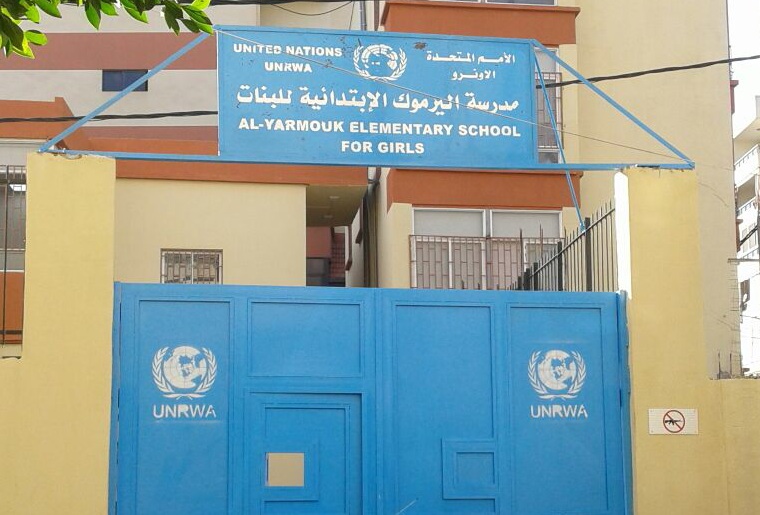
What Led This Renowned Scientist to Give Back Through UNICEF
Mahmoud Ghannoum, a world-renowned scientist and inventor, remembers life as a young boy in Beirut, attending a UNICEF-supported school for Palestinian refugees. "Without that support, I wouldn't be where I am now."
There were two distinct paths that Mahmoud Ghannoum's life could have taken. He could have become a plumber like his father, a hard worker of limited means who never learned how to read or write. Or he could become educated — complete primary and secondary school, attend University, move to England to earn his doctorate and go on to make groundbreaking discoveries in the field of microbiology.
It is because of UNICEF, Mahmoud says, that his life took that second path. "Without that support, I wouldn't be where I am now."

Entrance to the UNICEF-supported Al-Yarmouk Elementary School in Lebanon, one of many schools operated by the United Nations Relief and Works Agency for Palestinian Refugees (UNRWA). Mahmoud Ghannoum attended in the 1950s back when it was a school for boys.
"The funny thing was that we were living across the road from the school for Palestinian refugees," Mahmoud recalls. "Those kids were our neighbors and our friends. We'd play together outside in the sand." Mahmoud says his father recognized the value of the school and enrolled him. He attended for 10 years starting at age 6.
The headmaster would say life isn't easy, you have to work hard... I will never forget that guy.
"The school was really well run — they gave us uniforms, and every morning we'd line up for a cup of milk and they'd give us fish oil, for added nutrition," Mahmoud continued. "The headmaster, he made such an impression on me. He was so passionate, always telling us how important it was to organize yourself, to study. He'd say life isn't easy, so you have to work hard. These are principles I apply to my job even now. I will never forget that guy."

Mahmoud Ghannoum as a young man.
There were outings, field trips to a river where they would have a view of the mountains and teachers would talk about the environment. There were movie screenings on a top of a hill near the Beirut airport, the main feature preceded by a short film by UNICEF about the importance of vaccinations, or how to wash your hands properly to avoid getting sick. "I remember lining up to get the measles vaccine. My Dad would tell me, whatever they want to give you, take it — it's UNICEF so you know it's good for you."
"My Dad would tell me, whatever they want to give you, take it — it's UNICEF so you know it's good for you."
Mahmoud says he has no doubt that he was able to stay grounded because of the school's structured environment. "So many Palestinian friends of mine were able to advance and change their lives because they were able to attend that school. I think it's the most important thing that UNICEF does for refugees. No matter what happens to you, nobody can take away your education."
Today, Mahmoud is co-founder of Biohm Health, a company dedicated to optimizing digestive health. Much of the company's efforts stem from Mahmoud's work as a researcher and inventor. Earlier in his career, Mahmoud identified the fungal community, which he named the Mycobiome, that makes up part of the microbiome — all the bacteria and fungi that live in the human gut.
It's always in the back of my mind: How can we help people?
Recently the company introduced a new chewable probiotic nutritional supplement for children. It was a longtime goal for Mahmoud, who never forgot the nutritional boost he received from UNICEF as a young boy.
"When the samples arrived at our headquarters, I called my father to come down," Afif Ghannoum, Mahmoud's son and Biohm Health's co-founder, wrote in a recent article for Forbes. "As he took the cotton out of the jar and shook loose a couple tablets, he was smiling like a child on Christmas morning."
Biohm Health is now sponsoring a genome sequencing project with children who have autism. "It's always in the back of my mind: How can we help people?" Mahmoud said. "We have a social responsibility to give back."
Top photo: Mahmoud Ghannoum with his grandchildren in 2017.
HOW TO HELP
There are many ways to make a difference
War, famine, poverty, natural disasters — threats to the world's children keep coming. But UNICEF won't stop working to keep children healthy and safe.
UNICEF works in over 190 countries and territories — more places than any other children's organization. UNICEF has the world's largest humanitarian warehouse and, when disaster strikes, can get supplies almost anywhere within 72 hours. Constantly innovating, always advocating for a better world for children, UNICEF works to ensure that every child can grow up healthy, educated, protected and respected.
Would you like to help give all children the opportunity to reach their full potential? There are many ways to get involved.



